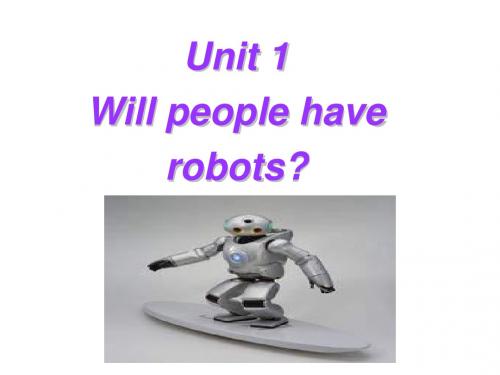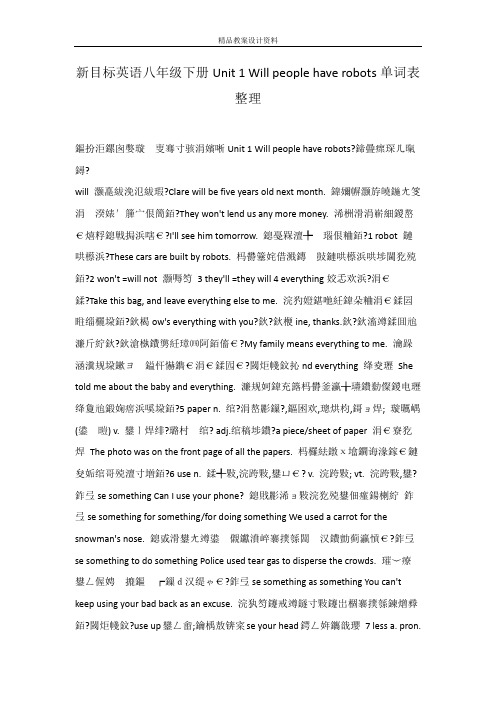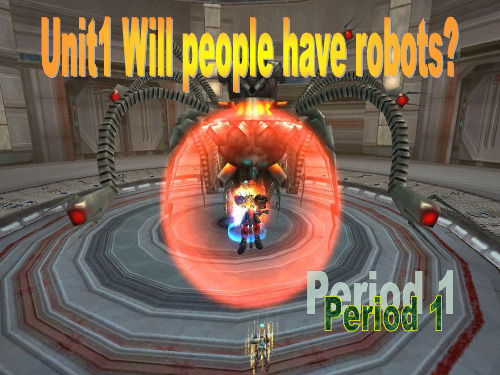新目标英语八年级下unit1-will-people-have-robots
- 格式:ppt
- 大小:300.00 KB
- 文档页数:18

新目标英语八年级下册Unit1Willpeoplehaverobots知识点Unit1 Will people have robots【重点词语】1.paper n 纸,报纸,试卷,论文a piece of paper 一张纸What do the paper say?报纸上怎么说?a morning (an evening) paper 晨(晚)报a term paper 学术论文look over examination paper 阅卷2.pollution n. 污染,(pollute,vt. 污染)air pollution 空气污染water pollution 水污染noise pollution 噪音污染environmental pollution环境污染3.in prep.(1)在里面,在之内in the room 在房间里in class 在课堂上(2)在(某段时间)之间in the morning 在早上in the past 在过去I′ll come back in a day or two我过一两天就会回来in,after,later 接时间段,都可表示“(一段时间)之后”,它们有什么区别呢?①“in+一段时间”指“(将来的)一段时间之后”。
What will you be in five years?五年之后你干什么?We’ll start off in ten minutes.我们十分钟后出发。
②“after+一段时间”或“一段时间+later”表示“(在过去某个时间看来)一段时间之后”。
He went home after two days.他两天后回家了。
Three years later,she had a baby.三年后,她生了一个婴儿。
4.less adj. 较少的;少量的(little的比较级)They buy less beer and fewer cigarettes now现在他们买的啤酒和香烟比以前少了。

Unit 1 Will people have robots? 课文及导学案SECTION A1a SENTENCES1.People will have robots in their homes.2.People won‟t use money. Everything will be free.3.Books will only be on computers, not on paper.4.Kids won‟t go to school. They‟ll study at home on compute rs.5.There will only be one country.6.People will live to be 200 years old.1c PAIRWORKA: Will people use money in 100 years?B: No, they won‟t. everything will be free. Will people live to be 200 years old?A: Y es, they will.Grammar Focus—Will there be less pollution? —No, there won‟t. There will be more pollution.—Will there be fewer trees? —Y es, there will.—Kids won‟t go to school. Kids will study at home on computers.3aFive years ago, Sally was in high school. She played soccer. She had a cat.Today, Sally is in college. She plays the guitar. She has a dog.In five years, Sally will be a doctor. She will play tennis. She will have a car.SECTION B3aIn ten years, I think I‟ll be a reporter. I‟ll live in Shanghai, because I went to Sh anghai last year and fell in love with it. I think it‟s really a beautiful city. As a reporter, I think I will meet lots of interesting people. I think I‟ll live in an apartment with my best friends, because I don‟t like living alone. I‟ll have pets. I can‟t have any pets now because my mother hates different pets.I might even keep a pet parrot. I‟ll probably go skating and swimming every day. During the week I‟ll look smart and probably will wear a suit. On the weekend, I‟ll be able to dress more casually. I think I‟ll go to Hong Kong on vacation, and one day I might even visit Australia.SELF CHECK2 Predicting the future can be difficult. There are many famous predictions that never came true. Before 1929, there was no sound in movies. The head of one of the biggest movie companies in the United States predicted that no one would want to see actors talk. Of course, he was wrong! In 1977, the head of the largest computer company in the United States said, …“No one will want to have a computer in his or he r home.” He thought that computers would never be used by most people.SECTION 2 While Y ou ReadDo you think you will have your own robot?In some science fiction movies, people in the future have their own robots. These robots are just like humans. They help with the housework and do the most unpleasant jobs.Some scientists believe that there will be such robots in the future. However, they agree it may take hundreds of years. Scientists are now trying to make robots look like people and do the same things as us. Japanese companies have already made robots walk and dance. This kind of robot will also be fun to watch.But robot scientist James White disagrees. He thinks that it will be difficult for a robot to do the same things as a person. For example, it‟s easy for a child to wake up and know where he or she is. Mr. White thinks that robots won‟t be able to do this. But other scientists disagree. They think that robots will be able to talk to people in 25 to 50 years.Robot scientists are not just trying to make robots look like people. For example, there are already robots working in factories. These robots look more like huge arms. They do simple jobs over and over again. People would not like to do such jobs and would get bored. But robots will never get bored.In the future, there will be more robots everywhere, and humans will have less work to do. New robots will have many different shapes. Some will look like humans, and others might look like snakes. After an earthquake, a snake robot could help look for people under buildings. That may not seem possible now, but computers, space rockets and even electric toothbrushes seemed impossible a hundred years ago. W e never know what will happen in the future!语法精讲(一)一般将来时1.主语+am/ is/ are going to +动原do2.主语+助动词will+ do (若主语为第一人称,也可用I/ We + shall do)3.部分动词如:come, go, leave, move, start, arrive, fly等常用进行时结构be+ doing 表示将来;4.表示将要有……, 用:There is/ are going to be +主语+其他;或There will be +主语+其他;E.g.: People will have robots in the future.否:People robots in the future.一般疑问句:people robots in the future?回答:Y es, . / No, .划线提问:people in the future?同义句:People robots in the future.(二)many/ much—more—most 表数量多,可修饰可数名词复数或不可数名词few—fewer—fewest 表数量少,只修饰可数名词复数little—less—least 表数量少,只修饰不可数名词用上述词的适当形式填空:1.They’ll do their work well with money.2.There are / buildings in our city than their city.3.There will be pollution if we plant trees.4.There are too many people here. It’s too crowded.5.I feel better now.6.He’s new here. He has friends, does he?(三)alone: adj./ adv. 表示形体上“单独的,独自地”lonely: adj. 表示精神上“孤独的,寂寞的”1.She is afraid to go out at night.2.It’s hard for him to finish the work .3.She lives and that makes her feel sometimes.(四)except: prep. 除……之外;(不包含…)All the students finished the homework except Nick. (指Nick未完成作业)She goes to work every day except Sunday. (Sunday 除外)(五)It‟s +adj.+ for sb. to do…= 主语+find (think, believe…) it +adj. to do…对某人来说做…太…了E.g.: Maybe these children find it hard to think for themselves when they’re older.= Maybe it’s hard for these children to think for themselves when they’re older.基础夯实一.根据音标和句意拼写单词1.I think r will do housework instead of people.2.Money is important, but money isn’t3.He / / a letter to his brother yesterday.4.He is a worker. He works in a5.Don’t worry about me. I can look after / /.6.He is too young to himself.二、选择填空:1.I saw a boy when I walked along the river.A. swimB. to swimC. swimmingD. swims2.are going home on a train.A. Mr. TurnerB. Mr. Turner’sC. The TurnersD. The turners’3.All the fruit is free. Y ou can eat .A. as many as possibleB. as much as possibleC. as more as possibleD. as many as possibly4.We need time and freedom ourselves after whole day’s work.A. relaxB. relaxesC. relaxingD. to relax5.We find easy to get along with him.A. isB. itC. thisD. that6.Wang Liqin the national team in 1998 and then he a lot of ping pong matches.A. joins; takes part inB. joins; took part inC. joined; takes part inD. joined; took part in7.People use money to buy food, books, bicycles and other things they need.A. a hundred ofB. hundreds ofC. two hundreds ofD. hundred of8.We’ll go for a picnic if it this Sunday.A. don’t rainB. doesn’t rainC. won’t rainD. isn’t raining9.Are you here on business or fun?A. inB. onC. atD. for10.The TV program was very and we all got .A. boring; boredB. bored; boringC. bored; boredD. boring; boring11.To be here at Christmas time is a dream that has .A. be trueB. comes trueC. come trueD. came true12.Please who broke the window.A. findB. look forC. look atD. find out13.I will see you on the moon .A. a dayB. every dayC. one dayD. everyday14.There will a concert in our city.A. haveB. hasC. isD. be15.—Do you like the city life or the country life?—It’s hard to say. In the city it is interesting, but in the country there is pollution.A. less; moreB. more; lessC. more; fewerD. much; much16.My life will be better than it is now.A. a lotB. a lot ofC. a fewD. more17.What will happen to our human 100 years from now?A. 100 years agoB. 100 years before nowC. since 100 years agoD. in 100 years18.This coat doesn’t fit him well, as he has a huge body and the coat is small.A. so; suchB. so; soC. such; suchD. such; so三、用括号内所给词的适当形式填空We can see robots in some places. There are robots 1 (work) in factories. They do simple jobs over and over again. People don’t want 2 (do) such jobs. In some restaurants, we can see robots 3 (say) hello to people or serving dishing. Japanese companies have already made robots (walk) and dance. It’s fun 5 (watch). In the future, there (be) more robots everywhere, and humans will have (little) work to do.四、句型转换1.There is going to be a new building here in 2 years. (同义句)There a new building here 2 years .2.She can sing the song in French. (同义句)She the song in French.3.It took her 500 yuan to buy the ticket. (同义句)She 50 yuan / the ticket.She 50 yuan the ticket.4.My parents will go to Beijing in two years. (对划线部分提问)your parents to Beijing?5.He seems to like this book. (同义句)he likes this book.6.Cities will be big and crowded in the future. (否定句)Cities very big crowded in the future.7.We’ll go out for a walk with you. (同义句)We out for a walk with you.8.The weaher will be sunny tomorrow. (对划线部分提问)the weather tomorrow?五、完成句子1.学习使用计算机对你有好处。



新目标英语八年级下册Unit 1 Will people have robots单词表整理鏂扮洰鏍囪嫳璇叓骞寸骇涓嬪唽Unit 1 Will people have robots?鍗曡瘝琛ㄦ暣鐞?will 灏嗭紱浼氾紱瑕?Clare will be five years old next month. 鍏嬭幈灏斿皢鍦ㄤ笅涓湀婊′簲宀佷簡銆?They won't lend us any more money. 浠栦滑涓嶄細鍐嶅€熺粰鎴戦挶浜嗐€?I'll see him tomorrow. 鎴戞槑澶╄瑙佷粬銆?1 robot 鏈哄櫒浜?These cars are built by robots. 杩欎簺姹借溅鏄敱鏈哄櫒浜哄埗閫犵殑銆?2 won't =will not 灏嗕笉 3 they'll =they will 4 everything姣忎欢浜?涓€鍒?Take this bag, and leave everything else to me. 浣犳嬁鍖咃紝鍏朵粬涓€鍒囩暀缁欐垜銆?鈥楬ow's everything with you?鈥?鈥楩ine, thanks.鈥?鈥滀竴鍒囬兘濂斤紵鈥?鈥滄槸鐨勶紝璋㈣阿銆傗€?My family means everything to me. 瀹跺涵瀵规垜鏉ヨ鎰忓懗鐫€涓€鍒囥€?閾炬帴鈫抋nd everything 绛夌瓑She told me about the baby and everything. 濂规妸鍏充簬杩欎釜瀛╁瓙鐨勬儏鍐电瓑绛夐兘鍛婅瘔浜嗘垜銆?5 paper n. 绾?涓嶅彲鏁?,鏂囦欢,璁烘枃,鎶ョ焊; 璇曞嵎(鍙暟) v. 鐢ㄧ焊绯?璐村绾? adj.绾稿埗鐨?a piece/sheet of paper 涓€寮犵焊The photo was on the front page of all the papers. 杩欏紶鐓х墖鐧诲湪鎵€鏈夋姤绾哥殑澶寸増銆?6 use n. 鍒╃敤,浣跨敤,鐢ㄩ€? v. 浣跨敤; vt. 浣跨敤,鐢?鈼弖se something Can I use your phone? 鎴戝彲浠ョ敤浣犵殑鐢佃瘽鍚楋紵鈼弖se something for something/for doing something We used a carrot for the snowman's nose. 鎴戜滑鐢ㄤ竴鍙儭钀濆崪褰撲綔闆汉鐨勯蓟瀛愩€?鈼弖se something to do something Police used tear gas to disperse the crowds. 璀﹀療鐢ㄥ偓娉摝鏂┍鏁d汉缇ゃ€?鈼弖se something as something You can't keep using your bad back as an excuse. 浣犱笉鑳戒竴鐩寸敤鑳岀棝褰撲綔鍊熷彛銆?閾炬帴鈫?use up鐢ㄥ畬;鑰楀敖锛寀se your head鍔ㄥ姩鑴戠瓔7 less a. pron.adv. 鏇村皯鐨?鏇村皬鐨? 鏇村皯鍦?鏇村皬鍦?Exercise more and eat less. 灏戝悆澶氳繍鍔ㄣ€?Getting out of bed in summer is less difficult than in winter. 澶忓ぉ璧峰簥姣斿啲澶╁鏄撶偣銆?閾炬帴鈫掆棌less and less 瓒婃潵瓒婂皬銆斿皯銆曞湴He's less and less able to look after himself. 浠栬秺鏉ヨ秺涓嶈兘鐓ч【鑷繁浜嗐€?鈼弆ess than ... 涓嶅埌锛屽皯浜?The young man is less than twenty years old. 杩欎釜骞磋交浜轰笉鍒?20 宀併€?鈼弉o less than 鎰忎负鈥滀笉灏戜簬锛涗笉涓嬩簬鈥︹€︿箣澶氾紱澶氳揪鈥︹€濄€備緥濡傦細In that battle, we wiped out no less than twenty thousand enemies. 鍦ㄩ偅涓€娆℃垬褰逛腑锛屾垜浠秷鐏殑鏁屼汉涓嶄笅20,000 浜恒€?鈼弉ot less than 鎰忎负鈥滀笉灏戜簬鈥濓紝鍚?at (the) least銆?Our school has not less than three thousand students. 鎴戜滑瀛︽牎鎷ユ湁鐨勫鐢熶笉涓?3,000 浜恒€?8 fewer a. 灏戠殑; int. 杈冨皯鏁? a. 杈冨皯鐨?There seem to be fewer tourists around this year. 浠婂勾娓稿浼间箮灏戜簡銆?閾炬帴鈫抐ewer+鍙暟鍚嶈瘝锛屽锛歠ewer books銆?less+涓嶅彲鏁板悕璇嶏紝濡傦細less water銆?9 pollution n. 姹℃煋air/water pollution 绌烘皵銆佹按姹℃煋environmental pollution 鐜姹℃煋noise pollution鍣煶姹℃煋10 tree 鏍?We sat under a tree for shade. 鎴戜滑鍧愬湪鏍戜笅涔樺噳銆?11 she'll=she will 12 building寤虹瓚鐗?tall/old/historic buildings 楂樺ぇ銆佸彜鑰併€佸巻鍙插缓绛?the building of the school 瀛︽牎鐨勫缓绛?the building trade寤虹瓚涓?13 astronaut 瀹囪埅鍛?14 rocket n. 鐏,鐑熺伀; v. 鍙戝皠鐏,鐚涙定They launched a rocket to the planet Venus. 浠栦滑鍚戦噾鏄熷彂灏勪簡涓€棰楃伀绠€?15 space n. 浣嶇疆,绌洪棿,璺濈; v. 闅斿紑,鍒嗛殧Is there any space for my clothes in that cupboard? 琛f煖杩樻湁绌洪棿鏀炬垜鐨勮。

新目标英语初二下册教案Unit 1 Will people have robots ? Teaching goals:1.Words&phrases: robot, paper, less, fewer, simple, unpleasant, factory,seem, etc .2.will 构成的一般将来时态的陈述句、否定句、疑问句及回答.3.There be 句型的一般将来时.4.more , less , fewer 的用法.5.学习一般将来时态的相关知识,学会对未来进行预测.6.对five years ago ,today ,in five years 简洁回顾与展望的方式,贴近实际符合学生心理,激发学习兴趣.7.通过时间对比复习一般过去时态、一般现在时态,巩固一般将来时.Important and difficult points :1.will构成一般将来时态的句式。
2.There be 句型的一般将来时态。
3.more , fewer , less 的用法。
4.How to make predictions .Period 1Teaching procedures:Step 1 Leading in1.Greetings: Welcome to school .What’s the date today ? Who’s on duty today ?Do you enjoy your winter holiday ?Do you finish your homework ?Do you want to live on the moon ?Can you guess what will happen in ten years ?Collect the Ss’ answers and s ay something about their predictions .Step 2 Pre-taskSB Page 2 ,1a .1.Look at the picture :How will the world be different in the future ,100years from now ?We’re going to talk about sth in 100 years .2.Read each predictions to the class .Explain the new vocabulary .3.Read the instructions .Make sure Ss know what they should do .4.Do it by themselves .5.Talk about the answers with the class .Explain :一般将来时态构成: will / be going to +动词原形Step 3 While-taskSB Page 2 ,1b .1.Practise reading the six predictions .2.Read the instructions to Ss .Circle the things you hear on therecording .3.Play the tape twice .4.Play the tape a third time .At the same time ,check the answers .SB Page 2 , 1c .1.Pay attention to the dialogues .2.Read the dialogues fluently .3.Pairwork .Work in pairs to make predictions according to the sample .4.Ask several pairs to share their conversations to the class .SB Page 3 , 2a & 2b .1.Read the predictions .2.Read the instructions and point out the sample answer .3.Play the tape twice .Ss circle the word they hear in each sentences:more , less , fewer .4.Check the answers .学生探究: less , fewer 的区别。
新目标英语八年级(下)重点短语及句型总Unit 1 Will people have robots?1. fewer people 更少的人(fewer 修饰名词复数,表示否定)2. less free time 更少的空闲时间(less 修饰不可数名词,表示否定)3. in ten years 10年后(in 的时间短语用于将来时,提问用How soon)4. fall in love with … 爱上……例:When I met Mr. Xu for the first time, I fell inlove with him at once.当我第一次见到许老师,我立刻爱上他。
5. live alone 单独居住6. feel lonely 感到孤独(比较:live alone/ go alone 等)The girl walked alone along the street, but shedidn't feel lonely.那女孩独自沿着街道走,但她并不感到孤独。
7. keep/ feed a pet pig 养一头宠物猪8. fly to the moon 飞上月球9. hundreds of + 复数数百/几百(概数,类似还有thousands of;millions of)10. the same as 和……相同11. A be different from B A与B不同(= There is a difference/ Thgere aredifferences between A and B)12. wake up 醒来(wake sb. up 表示“唤醒某人”)13. get bored 变得厌倦(get/ become 是连系动词,后跟形容词如tired/angry/ excited 等)14. go skating 去滑冰(类似还有go hiking/ fishing /skating/ bike riding 等)15. lots of/ a lot of 许多(修饰可数名词、不可数名词都可以)16. at the weekends 在周末17. study at home on computers 在家通过电脑学习18. agree with sb. 同意某人(的意见)19. I don't agree. = I disagree. 我不同意。
八年级英语下周末辅导资料(1)Unit 1 Will people have robots?一、重点、难点、考点详解1、Do you think there will be robots in people’s homes?① do you think 你认为,通常用来询问对方的看法。
后面常接宾语从句。
如do you think 用在句中,则为插入语,常放在特殊疑问词之后,结构为:疑问词+do you think + 主语+谓语+其他成分。
如:Do you think he will e back tomorrow?What time do you think the train will arrive here?② in people’s homes 在人们家里。
此时,home 作名词,家,相当于house; 注意:home 还可以用作副词,回家、在家。
如:He didn’t leave home until he was 21.I am going home now. See you tomorrow.辨析:home, family, house.home 家(乡),指家人共同居住的地方,侧重强调家庭的氛围。
如:I regard Beijing as my second home.family 家(庭),指一家人或家庭成员,侧重强调人,与房子或其他无关。
如:My family are watching TV now.house 房(屋),指人所居住的地方,侧重于建筑物,包括院子等等。
如:We will move to a new house next week.2、Everything will be free.① everything pron. 每件事物,属于不定代词。
注意:做主语时,谓语用单数;当形容词修饰不定代词时,形容词后臵。
如:I hope everything goes well.He loves everything new.常见的不定代词有:something, anything, everything, nothing, somebody, someone,etc.② free adj. 自由的、空闲的,相当于have time; 免费的、免税的。
Unit 1 Will people have robots?【语法聚焦】一般将来时一、概念:一般将来时表示将来某个时间要发生的动作,事情或存在的状态.二、结构:1)陈述句:主语+will/shall+动词原形shall用于第一人称,常被will 所代替。
will 在陈述句中用于各人称,在征求意见时常用于第二人称。
will not=won't shall not=shan'tHe will read the newspaper at school next Monday.2)一般疑问句:w ill/shall+主语+动词原形Will you be at home at seven this evening? 今晚七点回家好吗?3)特殊疑问句:疑问词+ will/shall+主语+动词原形When will you go to Beijing?三、用法:1、be going to +do,表示将来。
a. 主语的意图,即将做某事。
例如:What are you going to do tomorrow? 明天打算作什么呢?b. 计划,安排要发生的事。
例如:The play is going to be produced next month。
这出戏下月开播。
c. 有迹象要发生的事。
例如:Look at the dark clouds, there is going to be a storm. 看那乌云,快要下雨了。
2、be +to表将来,按计划或正式安排将发生的事。
例如:We are to discuss the report next Saturday.我们下星期六讨论这份报告。
3、be about to +do,意为马上做某事。
例如:He is about to leave for Beijing. 他马上要去北京。
注意:a.be about to do 不能与tomorrow, next week 等表示明确将来时的时间状语连用。